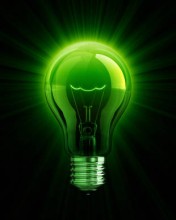Home » Articles, Economics, Featured, From the President \ Tags: Economics, energy, government regulation,green, intervention, policies
ENERGY KNOW-IT-ALLS

Energy Know-It-Alls
By Lawrence W. Reed
Growing up, I was taught that wisdom begins with understanding that no matter how much you may think you know, there’s still an infinite amount of knowledge that you don’t.
That truth had two big effects on me in all the decades since I first heard it. One, it ignited a curiosity to learn more. Two, humility became a habit. I realized that all the knowledge I’ve gained—especially about the future—is still no bigger than a blade of grass on a football field.
Yet all around us are people who claim to know far more than I suspect they do or ever will. When they dream and scheme with their own time and money, it’s not a problem. What’s disturbing is that many of these know-it-alls are so confident in their pseudo-omniscience that they want to use the force of government to impose their dreams and schemes on the rest of us. Washington is full of people who are busy planning almost every aspect of our lives, no matter how well or poorly they might be managing their own.
Energy is a case in point. An entire religion has arisen against fossil fuels and in favor of various “green” options. Its high priests tell us that we’re running out of oil, that things like wind or solar or algae power are the way to go, and—here’s the rub—subsidies, taxes and mandates are needed to get us there.
They would do well to contemplate the wisdom of the late Nobel laureate economist F. A. Hayek, who said, “The curious task of economics is to demonstrate to men how little they really know about what they imagine they can design.”
In the early 19th century, Americans used whale oil as their primary fuel for lighting. Prices rose as the demand for whale oil grew and the supply of whales declined (they were “common” property, not private, so everyone had an incentive to use them and no one had much reason or ability to conserve them). No federal energy department existed to either plan our lighting future or regulate the problem into perpetuity. And guess what? No bureaucrat predicted it in 1850 but within 25 years, we switched from whale oil to kerosene, derived from crude oil produced by a brand new industry. Supply and demand, prices acting as signals in a free marketplace, entrepreneurs taking risks to make a buck—all of that worked beautifully and without a mastermind.
Isn’t this what happens all the time when people are economically free? Computer chips, satellites and lasers replaced wires, transistors and vacuum tubes. Cars replaced mountains of horse manure in our city streets. If we started running out of trees, do you think we’d have to wait for a government edict before somebody would think to plant more? What on earth makes anyone think that government regulators, control freaks and spendaholics know more about the future than do the real creators of wealth who actually have to solve problems or go out of business?
Think about it. If somebody claims to know the future well enough to justify government pushing us there, you should demand that they answer this question: “Why aren’t you a quadrillionaire?” Anyone who knows the future and has the courage to put his own money where his mouth is has no excuse for not owning the planet.
Maybe wind, solar, algae or something as yet undiscovered will prove superior to fossil fuels. I don’t know. But how will anybody know unless we let all possibilities compete freely? I can think of no good reason to substitute the judgment of short-sighted, election-focused and often power-hungry government officials over the judgment of markets. How many green-energy boondoggles, steeped in political pay-offs to cronies, must we endure before this elemental principle is widely understood?
America was born in a healthy, well-earned skepticism of central planners. Perhaps we should re-learn why that was the case because some pretty remarkable things happened as a result. As economist Thomas Sowell puts it, “American prosperity and American free enterprise are both highly unusual in the world, and we should not overlook the possibility that the two are connected.”
#####
(Lawrence W. Reed is president of the Foundation for Economic Education. A condensed version of this piece will appear this month in the quarterly newsletter of the Mackinac Center for Public Policy—http://www.mackinac.org. Before becoming president of FEE in September 2008, Reed was president of the Mackinac Center since its inception in 1987.)
For further reading, see:
“Witch-Hunting for Robber Barons: The Standard Oil Story” by Lawrence W. Reed:http://www.thefreemanonline.org/columns/witch-hunting-for-robber-barons-the-standard-oil-story/
“Let’s Not be Energy Independent” by David R. Henderson: http://www.thefreemanonline.org/features/lets-not-be-energy-independent/
“Energy: The Master Resource” by George Leef: http://www.thefreemanonline.org/book-reviews/book-review-energy-the-master-resource-by-robert-l-bradley-jr-and-richard-w-fulmer/
“Mandating Renewable Energy: It’s Not Easy Being Green” by Michael Heberling:http://www.thefreemanonline.org/features/mandating-renewable-energy-its-not-easy-being-green/
“A Free Market Energy Vision” by Robert L. Bradley Jr.: http://www.thefreemanonline.org/features/a-free-market-energy-vision/
“The False Promise of Green Energy” by Morriss, Bogart, Meiners and Dorchak:http://www.cato.org/store/books/false-promise-green-energy


No comments:
Post a Comment